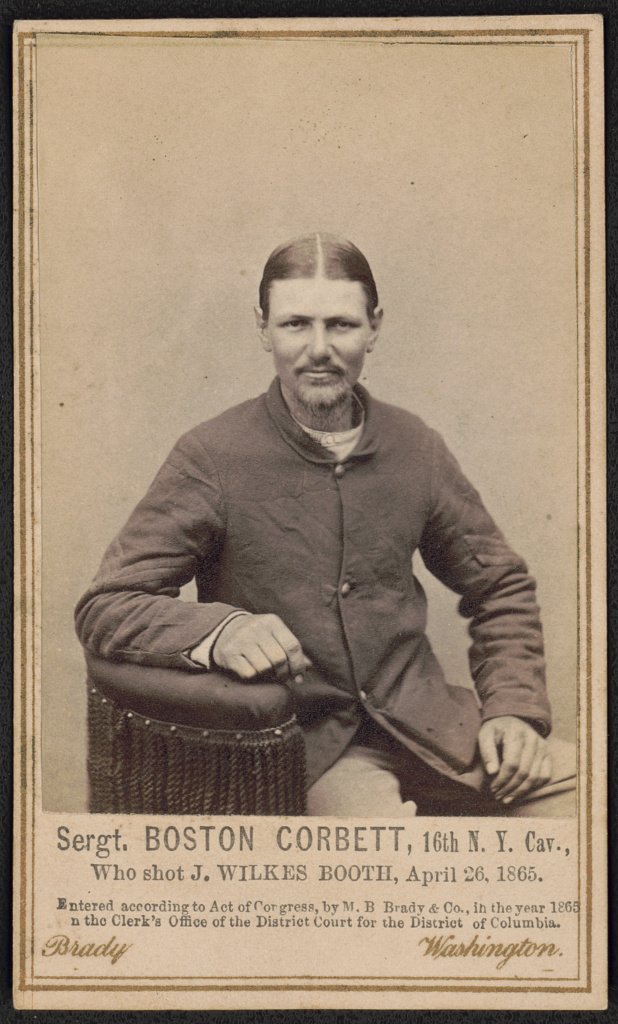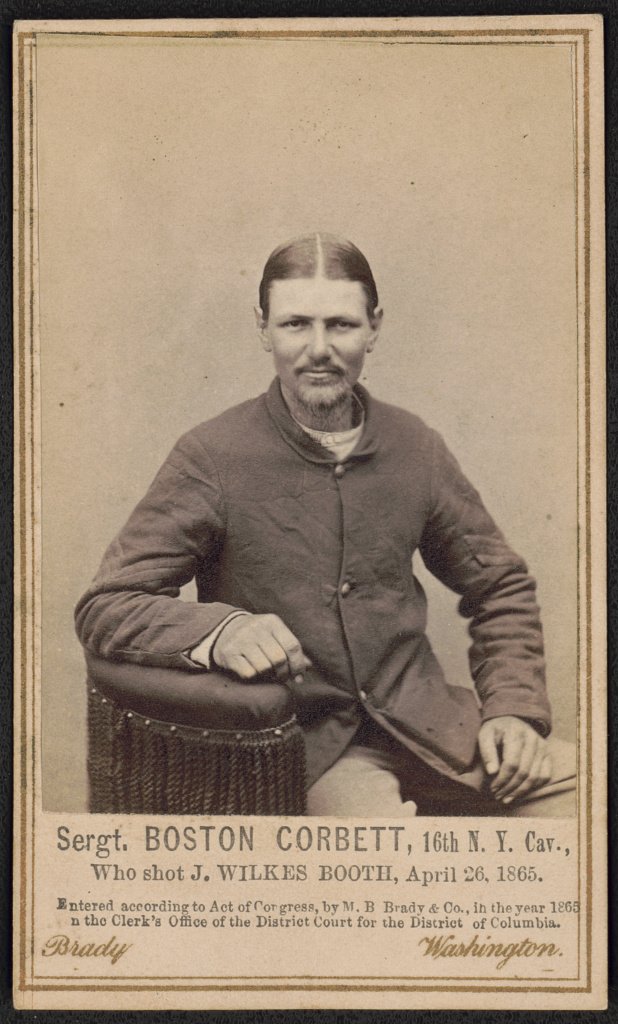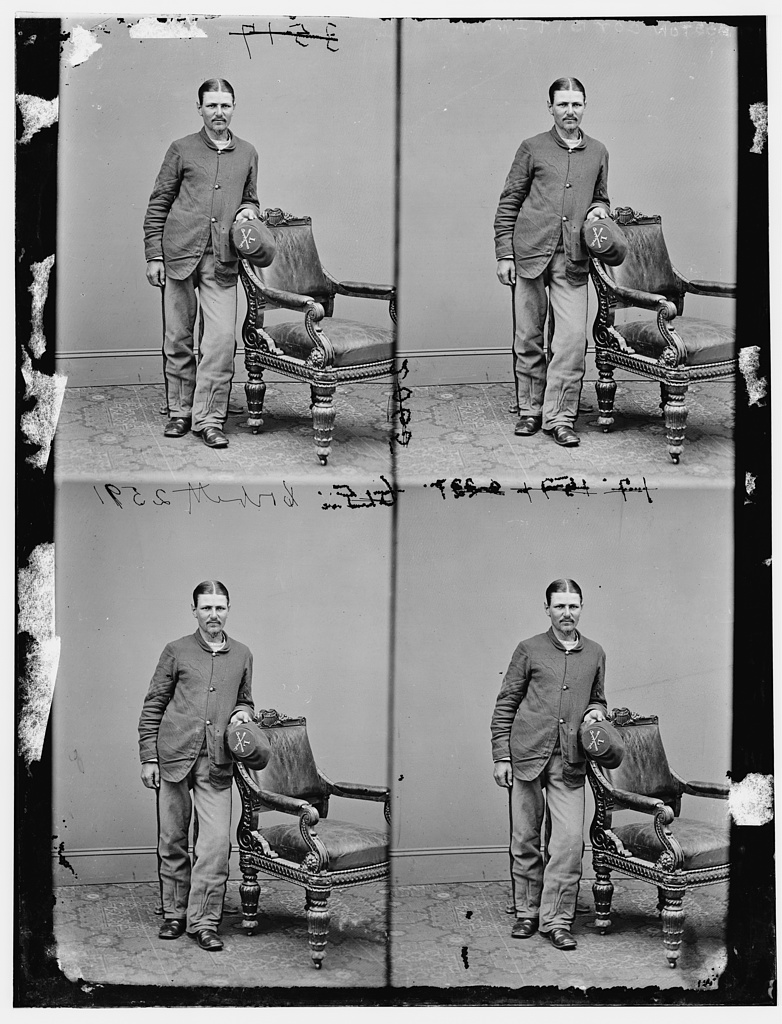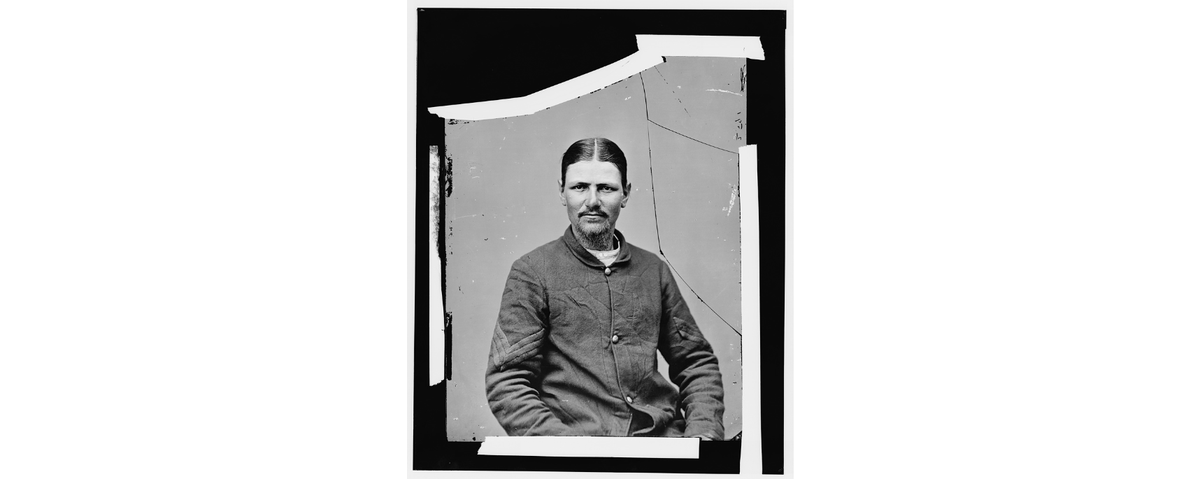We all know John Wilkes Booth shot Lincoln, but who shot Booth?
Grab a chair and a strong drink, because it& #39;s time for a thread about the wild life of BOSTON CORBETT.
(1/)
Grab a chair and a strong drink, because it& #39;s time for a thread about the wild life of BOSTON CORBETT.
(1/)
And as a brief disclaimer, I am not a historian by profession!
Most of the information listed in this thread is from "Legends and Lies: Great Mysteries of the American West"
by Dale L. Walker.
(2/)
Most of the information listed in this thread is from "Legends and Lies: Great Mysteries of the American West"
by Dale L. Walker.
(2/)
Corbett was born in London in 1832 and moved to Troy, NY with his parents in 1839 (so far so good).
Unfortunately his family was quite poor, and he had to learn the trade of hat-making starting from a young age (it& #39;s all downhill from here pretty much).
(3/)
Unfortunately his family was quite poor, and he had to learn the trade of hat-making starting from a young age (it& #39;s all downhill from here pretty much).
(3/)
In the 1850& #39;s, hats were often made of rabbit and beaver, and you had to soak the pelts in giant vats of mercury nitrate to turn them into felt.
As you can imagine, standing over tubs of this stuff and inhaling the fumes is not a healthyfuntimes activity.
(4/)
As you can imagine, standing over tubs of this stuff and inhaling the fumes is not a healthyfuntimes activity.
(4/)
This *might* even be where the phrase "mad hatter" comes from, because excessive exposure to mercury nitrate can cause personality changes, tremors, coordination problems and even hallucinations.
(5/)
(5/)
Also the "mad hatter" phrase might pre-date hats being made with mercury. Language is weird! Onward regardless!
Anyway, back to poor young Corbett, who was hanging out with the bad fumes, and went around plying his trade in various cities on the East Coast.
(6/)
Anyway, back to poor young Corbett, who was hanging out with the bad fumes, and went around plying his trade in various cities on the East Coast.
(6/)
Corbett got married at some unknown point!
(pause to appreciate the small happiness before moving on)
...and his wife died while giving birth to a daughter. The baby didn& #39;t survive either.
Following the tragedy, he began to drink heavily and became homeless.
(7/)
(pause to appreciate the small happiness before moving on)
...and his wife died while giving birth to a daughter. The baby didn& #39;t survive either.
Following the tragedy, he began to drink heavily and became homeless.
(7/)
The stories on how he found religion conflict a bit, but he was apparently convinced to become a Methodist and then was baptized in Boston.
Did I forget to mention that his name was really Thomas? He changed his name to Boston because he was converted in the city.
(8/)
Did I forget to mention that his name was really Thomas? He changed his name to Boston because he was converted in the city.
(8/)
Corbett then sobered up and became increasingly devout AND increasingly eccentric.
His chosen hairstyle was long because Jesus had long hair.
He also seemed to do a lot of yelling at people on the street around this time (late 1850s).
(9/)
His chosen hairstyle was long because Jesus had long hair.
He also seemed to do a lot of yelling at people on the street around this time (late 1850s).
(9/)
Well known enough to be referred to as the "Glory to God Man" by local newspapers, things were going *sort of* okay until 1858. He was mostly just a street preacher who was a bit weird.
The next tweet is not for the squeamish.
(10/)
The next tweet is not for the squeamish.
(10/)
One July day in 1858, Corbett was propositioned by two prostitutes on the street.
This event upset him so much that when he returned to his boardinghouse room, he castrated himself with a pair of scissors.
(11/)
This event upset him so much that when he returned to his boardinghouse room, he castrated himself with a pair of scissors.
(11/)
He did not immediately seek treatment (ouch), but eventually ended up at Mass General for two days.
Then Ol& #39; Boston falls off the map for the next 2.5ish years until he shows up in New York again and enlists in the militia.
(It& #39;s now 1861 and early in the Civil War).
(12/)
Then Ol& #39; Boston falls off the map for the next 2.5ish years until he shows up in New York again and enlists in the militia.
(It& #39;s now 1861 and early in the Civil War).
(12/)
Corbett& #39;s military career was a mess of disciplinary problems.
He& #39;d go around randomly shouting Bible quotes at his fellow soldiers and commanders.
One source says that he was court-martialed and ordered to be shot because of his behavior.
(13/)
He& #39;d go around randomly shouting Bible quotes at his fellow soldiers and commanders.
One source says that he was court-martialed and ordered to be shot because of his behavior.
(13/)
He somehow escaped that fate, was discharged from the militia and then RE-ENLISTED with a cavalry regiment in NY.
That (maybe?) went okay until he was captured by the Confederacy and sent to the brand-spankin& #39; new (and notoriously terrible) Andersonville Prison.
(14/)
That (maybe?) went okay until he was captured by the Confederacy and sent to the brand-spankin& #39; new (and notoriously terrible) Andersonville Prison.
(14/)
Corbett spent five months at Andersonville (bad) until he was released in a prisoner exchange in November of 1864 (good).
He got treated for scurvy and malnutrition (ouch) and then rejoined the 16th New York Cavalry Regiment in 1865 (good?? bad??).
(15/)
He got treated for scurvy and malnutrition (ouch) and then rejoined the 16th New York Cavalry Regiment in 1865 (good?? bad??).
(15/)
Hey, we& #39;re finally at the John Wilkes Booth part!
Lincoln is shot on April 14, 1865 and dies the next day.
Corbett& #39;s regiment is sent to aid in the search for Booth on the 24th.
(16/)
Lincoln is shot on April 14, 1865 and dies the next day.
Corbett& #39;s regiment is sent to aid in the search for Booth on the 24th.
(16/)
On the 26th, Corbett& #39;s regiment surrounds the barn holding Booth at the Garret Farm.
(I& #39;m not going through Booth& #39;s whole escape/journey, that& #39;s a Wikipedia article ya can read yerself.)
The regiment lights the barn on fire to force Booth out.
(17/)
(I& #39;m not going through Booth& #39;s whole escape/journey, that& #39;s a Wikipedia article ya can read yerself.)
The regiment lights the barn on fire to force Booth out.
(17/)
Then from outside the barn, Corbett shoots Booth and other members of the regiment drag the man from the burning building.
Aaaaand the Secretary of War Stanton had said for Booth to be captured alive, so that was a bit of a problem.
(18/)
Aaaaand the Secretary of War Stanton had said for Booth to be captured alive, so that was a bit of a problem.
(18/)
Corbett may have not even been the one to fire the gun, but he did take responsibility for it.
Boston Corbett was then court-martialed for a second time, subsequently pardoned by Stanton and became a bit of a folk hero.
(19/)
Boston Corbett was then court-martialed for a second time, subsequently pardoned by Stanton and became a bit of a folk hero.
(19/)
Discharged from the army in 1865, Boston went back to the hat trade for a bit.
By 1870, he tried to capitalize on the whole"Lincoln& #39;s Avenger" thing.
He was often invited to give speeches about himself, but was never invited back. (Remember the whole eccentric thing?)
(20/)
By 1870, he tried to capitalize on the whole"Lincoln& #39;s Avenger" thing.
He was often invited to give speeches about himself, but was never invited back. (Remember the whole eccentric thing?)
(20/)
Okay, I need to wrap this up, it& #39;s my bed time!!
1875 - almost kills a man in anger
1878- moves to Kansas, still preachin& #39;
Jan. 1887 - made a doorkeeper of the Kansas House of Representatives
Feb. 1887 - threatens to kill officers of the Kansas House, sent to an asylum
(21/)
1875 - almost kills a man in anger
1878- moves to Kansas, still preachin& #39;
Jan. 1887 - made a doorkeeper of the Kansas House of Representatives
Feb. 1887 - threatens to kill officers of the Kansas House, sent to an asylum
(21/)
In 1888, Corbett manages to ESCAPE FROM THE ASYLUM on horseback and briefly stays with a friend. He tells the friend he is headed to Mexico.
1888-1894 - ????????
(22/)
1888-1894 - ????????
(22/)
And no one really knows what happened to him after that! It& #39;s thought that he moved to Minnesota and died in a fire that destroyed the town of Hickney in 1894.
"Thomas Corbett" was listed as one of the victims missing or dead after the fire.
(23/)
"Thomas Corbett" was listed as one of the victims missing or dead after the fire.
(23/)

 Read on Twitter
Read on Twitter





